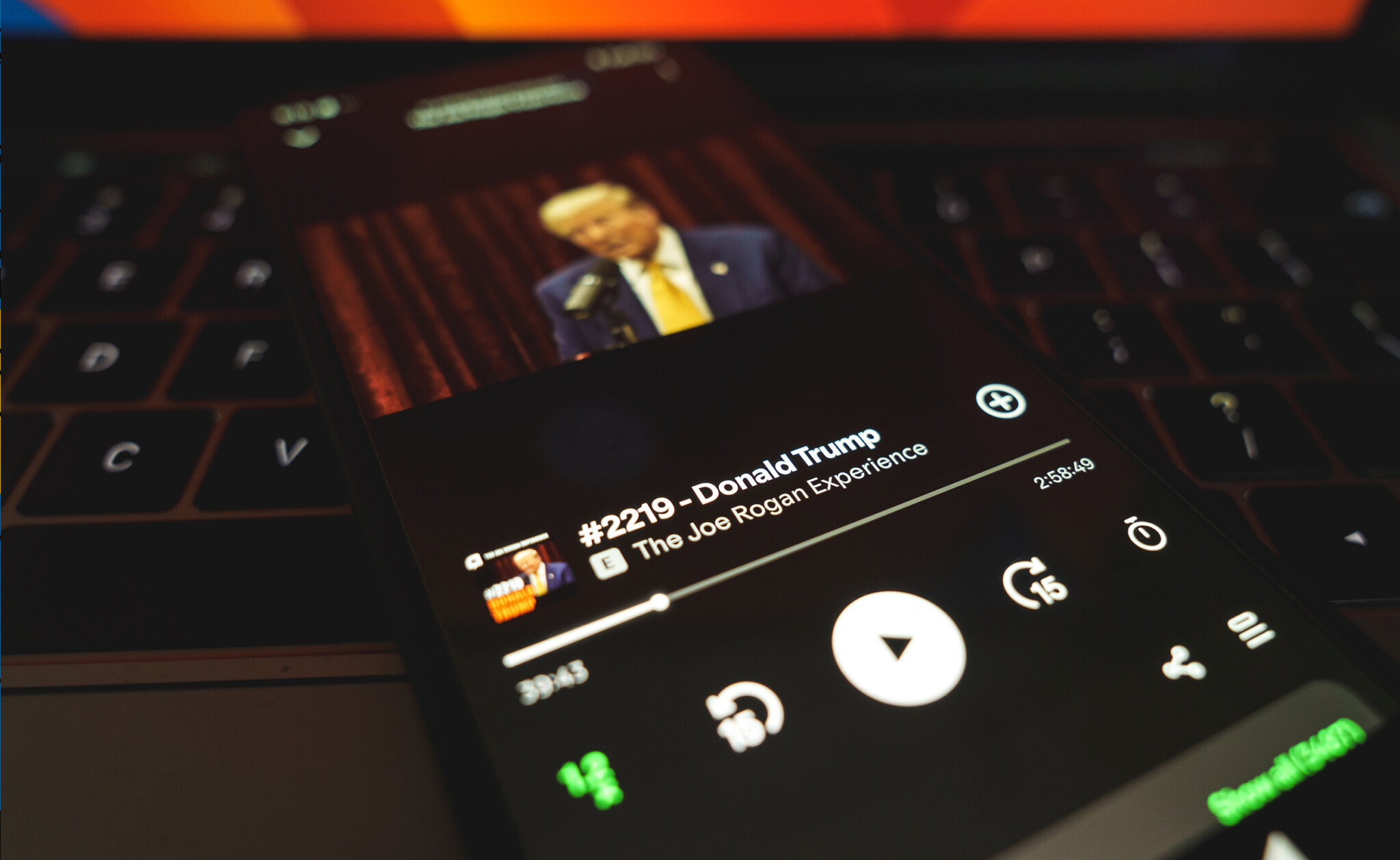Trump and Harris’ recent podcast appearances reveal the intense gender-polarization of this election. In early October, Harris appeared on Alex Cooper’s viral podcast Call Her Daddy, a show primarily about women’s sex and dating lives. Days ago, Trump broke the Internet by appearing on Joe Rogan’s podcast (80% of whose viewers are men aged 18-34) for a three-hour chat. In a revelation which has particularly endeared his supporters, Trump’s senior advisor credited Barron Trump for suggesting that Trump appear on podcasts like This Past Weekend with Theo Von, Impaulsive, and Joe Rogan – all with a predominantly male audience. While Harris’ appearance did little to reassure the public that she is sincere and possessing more mental acuity than Biden, Trump’s repartee with Rogan reminds us that he remains sharp, optimistic about the future, and – most importantly – funny.
The crucial difference between the two interviews is that viewers are privileged to a side of Trump which is rarely seen while he is campaigning. Harris, meanwhile, discloses nothing that she hasn’t already: That her mother raised her to be “emotionally open” is no great insight, and her typically long-winded platitudes about a woman’s right to bodily agency take up most of the discussion. Trump disclosed several anecdotes about mainstream media journalists and talking heads like Joy Behar who have privately declared their support or affection for Trump but feel incapable of voicing it publicly. “By the way, Whoopi loved me!”. In diplomatic fashion, Trump clarified that he understood the predicaments of former administration employees who do the same: “they won’t hire her unless [she disavows me]; I said ‘be negative, that’s OK’”. He discusses the two assassination attempts with remarkable grace and accepts the risks concomitant with his position. On the dangers he faces as one of the most divisive men in the world: “I make myself a target, and it’s a very dangerous business […] if only it were so easy [as being on The Apprentice]!”.

In his similarly relaxed sit-down interview with comedian Tim Dillon, J. D. Vance chatted about the realities of being on a nationwide tour while parenting young children. He extended a thought to Europe, whose demographic urban situation occupies much of my own writing, musing that London is losing its identity to untrammeled immigration. Vance knows how to outrage his detractors: This comment prompted the dubious claim that London was “built by immigrants” to be bandied about on X. Since fewer than 1% of Londoners were immigrants until a century ago, these claims fall flat. It should not go unnoticed that a prominent American statesman recognizes the British people’s predicament as a kind of warning to America, which risks following suit if it fails to take control of its border in the wake of Biden’s disastrous CHNV program.
The personal touch was the most enjoyable aspect of both interviews, though Trump did not shy away from policy. When discussing foreign affairs, Trump assured Rogan that he had a plan for approaching Vladimir Putin in order to de-escalate the war in Ukraine, but insisted that he keep the details private in order not to forfeit sensitive information. Trump’s aim is simple and clear: to remain in touch with nations like Russia and China in order to prevent the existential threat of nuclear armament from worsening. While discussing foreign policy relations with these “tricky” nations, Trump’s calm demeanor was notable and his self-assurance characteristically unwavering. From 2016-2020 his administration adopted a muscular approach to China, strengthening its ties with Taiwan and condemning its aggression in the South China Sea. But in this interview, Trump’s tone of respect for China as a world-leading state is palpable. He has undeniably toned down the brashness which would frequently send the mainstream media into a frenzy during his presidency. And, as Vance wrote for the Wall Street Journal, Trump’s aim to avoid taking Americans to war remains one of the best reasons to vote for him. Trump mentioned French President Emmanuel Macron (“a good friend of mine, but he’s a wise guy”) and Hungarian Prime Minister Viktor Orban (“ask Orban; he’ll tell you Russia is a war machine”). His ties to other world leaders are much more entrenched than those of Harris, and he was clever to remind the audience of this.
It was encouraging that Trump mentioned Harris relatively few times during the entire podcast. He might easily have gloated about the fact that he could riff with Rogan in a relaxed setting without a script for several hours at a time, a feat which would be inconceivable for the current Vice President. But he chose not to hammer home that comparison. Harris, meanwhile, rarely goes three sentences without mentioning her foe: In her forty-minute interview on Call Her Daddy, rather than citing her own record in order to make her case to become the next President, she was most comfortable bashing Trump. Most notably, she insisted that it’s a “bold-faced lie” that late-term and even after-birth abortions ever take place in the USA: “Are you kidding –- that is so outrageously inaccurate and it’s so insulting to suggest that would be happening and that women would be doing that […] this guy is full of lies.” Why, then, has Tim Walz’ Minnesota effectively legalized after-birth abortions? Are 1% (c. 6-7,000) of annual abortions in the States third-trimester abortions or not? As she moved into a condemnation of Trump, Harris’ language was simultaneously vague, rambling, and inflected with a tone of self-aggrandizing outrage (all charges which were constantly levied against Trump while he was in office):
“For most of my career as a prosecutor I understood that the words that I spoke and what I did with those words would be the difference between whether somebody was charged with a crime and went to prison, maybe for life […] the words I spoke […] could move markets. The idea that someone is using that voice in such an irresponsible way? […] Somebody who uses their voice and that microphone in that way should never be President of the United States”.
Predictably, Cooper and Harris were sure to re-litigate Vance’s controversial remarks about “childless cat ladies” (a comment on the fertility crisis which has outraged Democrats for weeks, but which no Democrat has addressed in substance – watch this space for my commentary on that). But Harris’ final statement was the most ironic moment of the entire interview: “You can look at my career to know what I care about. I care about making sure that people are entitled to and receive the freedoms that they are – do; I care about lifting people up and making sure that you are protected from harm; I care about tapping into the aspirations of people, knowing that we are capable of so much […] I believe in the promise of America”. In this spiel Harris did not cite any evidence, of her competence or integrity, from her past career, despite that opening clause. And it was disappointing but unsurprising for the Vice President to declare faith in the “promise of America” without beginning to describe what that promise actually entails. As this analysis of 40,000 viewers conducted for Newsweek shows, for swing voters, the gulf between Harris’ sugary platitudes (“thank you for your voice”) and Trump’s authenticity is increasingly hard to ignore.

Comments (0)
Only supporting or founding members can comment on our articles.